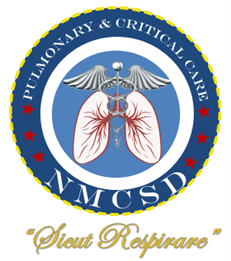Overview:
Being a board certified/eligible general Internist, a Pulmonary Critical Care Medicine Fellow is already equipped with a high level of clinical skills, including procedural abilities, interpersonal skills, and a strong foundation of medical knowledge. The additional wisdom accumulated during PCCM fellowship further enhances these skills, resulting in expertise in the areas of Pulmonary Diseases and Critical Care Medicine. The fellowship curriculum centers around the six core competencies: patient care, medical knowledge, practice-based learning and improvement, interpersonal skills and communication, professionalism, and systems-based practice. Through evaluations, faculty members have an opportunity to assess the fellow’s skills, values, and attitudes beyond just a written test. The evaluation process also promotes self-assessment and career progression. The system of evaluation is continuous and diverse, happening daily/weekly/monthly in different settings such as rounds, endoscopy suite, conferences, and while designing research projects.
- The Program Director, Associate Program Director, or key faculty will deliver written and verbal feedback monthly, utilizing the competency-based form for PCCM fellows in New Innovations. The evaluation criteria for successful completion of rotation assignments will become incrementally challenging as the three-year fellowship progresses. New Innovations tool will assess both cognitive and procedural skills.
- Every six months, a formal evaluation session will take place using the semi-annual PCCM Fellow evaluation form. The PCCM Fellowship Education Training Committee will create these evaluations based on methods specified in sections A, B, and C below. The Program Director or Associate Program Director will then review the evaluations with you.
- Every year, at least once, the standard Naval Officer Fitness Report or its equivalent will be filled as specified by the relevant BUPERS instructions.
- The fellows will also evaluate the program and staff regularly. Emphasis will be on staff effectiveness as educators and the program’s effectiveness in meeting your educational needs. The composite evaluations will support faculty in their professional development. Annual Program Review will use program evaluations.
- 360-degree evaluations will also incorporate evaluations of fellows by peers, patients, nurses, and ancillary staff. Each fellow will perform a self-evaluation.
- PCCM Program Directors Association conducts an annual “in-service” examination. Fellows use this exam as a self-assessment tool. This exam typically takes place in the spring.
- Key faculty and fellows participate in the Annual Program Review each spring.
Evaluation Methods:
- The fellow’s evaluation will include daily observations by the staff; monthly evaluation forms filled by staff on the New Innovations website; 360 evaluations; participation and preparation for journal club; written and verbal feedback post presentations; chart reviews; regular meetings of the Pulmonary Key Faculty.
- Program’s content, process, and trainees’ academic progress will be supervised by the PCCM Fellowship Education Committee, which includes the Program Director and Key Faculty. The Program Director will lead all meetings. The committee meets monthly. The committee, with representative fellows, will conduct an annual comprehensive program review (Program Annual Review) and update the Handbook/Curriculum as needed.
- The PCCM Fellowship Committee will assess each fellow’s performance in ACGME core competencies, clinical competence, teaching abilities, performance in technical procedures, and progress in research projects/process improvement projects.
- On a semi-annual basis, the PCCM committee will perform an extensive review of each fellow’s performance. Post this review, the Program Director will have an individual meeting with each fellow to discuss academic standing. A written record of this review will be added to the fellow’s training record.
